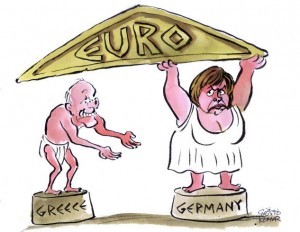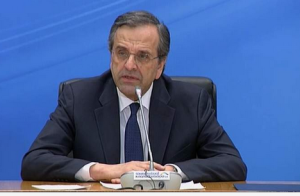Yesterday, Greece finally held its anxiously awaited general election, which many regarded as a referendum on that country’s membership in the Eurozone.
The consensus was that a win by the ruling New Democracy party, headed by Prime Minister Antonis Samaras, would mean more of the bitter austerity medicine Greeks have been taking for years as dues for continued membership; whereas a win by the opposition Syriza party, headed by Alexis Tsipras, would mean no more austerity – even if that forfeits membership.
Syriza won.
Tsipras has promised to renegotiate the country’s 240 billion-euro ($270 billion) international bailout deal, and seek forgiveness for most of Greece’s massive debt load. He has pledged to reverse many of the reforms that creditors demanded — including cuts in pensions and the minimum wage, some privatizations and public sector firings — in exchange for keeping Greece financially afloat since 2010.
(The Associated Press, January 25, 2015)
Except that Prime Minister Samaras himself spent years trying, to no avail, to renegotiate Greece’s bailout terms with these very same creditors – the “Troika” of the European Union, the International Monetary Fund, and the European Central Bank.
IMF Managing Director Christine Lagarde told CNBC Wednesday, before flying to Athens, she had no interest in adjusting Greece’s bailout terms.
‘I’m not in a negotiations or renegotiations mood at all.’
(UPI, July 6, 2012)
Therefore, either Syriza’s supporters are in for a rude awakening – as Greece’s indignant refusal to comply with bailout terms forfeits membership; or Troika members will swallow their institutional pride and allow the EU’s most vexatious debtor nation to dictate repayment terms. Trust me, you’d be forgiven for analogizing this standoff to an unruly child (Greece) refusing to eat the vegetables (austerity measures) his mother (the Eurozone) insists he must….
But I went on record years ago – not only warning that it would come to this, but also urging Eurozone leaders to cut their losses and kick Greece out before its debt contagion metastasizes.
 Here, for example, is an excerpt from “Greece: a Tumor Growing in Europe,” May 15, 2012.
Here, for example, is an excerpt from “Greece: a Tumor Growing in Europe,” May 15, 2012.
__________________
I find it stupefying that Greece is causing so much existential angst in Europe. Mind you, I used to accept the prevailing view that, like JPMorgan Chase, Greece is just too big to fail; moreover, that if it failed others would surely follow.
I am now convinced, however, that this transformative logic simply does not hold. Not least because the more appropriate analogy is not the risk of a major bank failing, but the fear of a little tumor metastasizing. And in this context, cutting Greece out of the Eurozone is the best way to forestall the self-fulfilling prophecy of its failure triggering a contagion/domino effect; you know, the way one might excise a metastasizing (malignant) tumor out of the body…
Greece is refusing to take the only medicine that stands any chance of putting the cancer it represents into remission. Frankly, this refusal alone demonstrates why it needs to be excised out of the Eurozone…
Greece should be left to its own devices to become the terminally debt-ridden, dysfunctional and ungovernable mess in Europe that Haiti has been in the Caribbean for centuries…
Despite the writing on the wall, European leaders have been implementing extraordinary measures to keep Greece on financial support, fearing that, if Greece fails and exits, other Eurozone countries like Portugal and Spain would follow. They should have been implementing measures to make Greece’s inexorable path towards failure and exit so painful for Greeks that other countries would want to avoid going down that primrose path like the plague.
This is why the only thing I find newsworthy about this Eurozone debt crisis today is the extent to which countries like Germany and France have allowed the financial contagion Greece represents to metastasize. The situation is clearly critical now.
So instead of begging Greece to take the medicine to save both itself and the ‘euro project,’ European leaders should be scrubbing for the surgery that is necessary to cut out Greece to save the Eurozone. Greece is not too big to fail.
____________________
 More to the point, though, here is how I characterized the congenital arrogance, which not only makes Tsipras think he can renegotiate bailout terms and get massive debt forgiveness, but also made voters pin their country’s fate on his impudent promises:
More to the point, though, here is how I characterized the congenital arrogance, which not only makes Tsipras think he can renegotiate bailout terms and get massive debt forgiveness, but also made voters pin their country’s fate on his impudent promises:
Greece may be the cradle of civilization, but it’s being regarded throughout Northern Europe these days as little more than a beggars’ colony. This is because Greece is now looking to richer member states of the European Union, like Germany and France, to bail it out of an existential financial mess…
[R]ich member states in the North believe that their poor relations in the South have nothing to blame for their financial woes but their own ‘Club Med’ approach to fiscal discipline…
You’d think that having to go to their betters in the North – hat in hand – would humble the Greeks. Instead, public sector workers have gone on strike in a self-indulgent effort to pressure their government against imposing any austerity measures as a condition for receiving a bailout package from the EU (and IMF).
(“Greece Just Another Panhandling PIG in Europe,” The iPINIONS Journal, April 29, 2010)
 Is it any wonder, then, that a majority of Greeks bought Tsipras’s promises hook, line, and sinker? You know, “money for nothing and the [kicks] for free,” with apologies to Dire Straits. This, despite Samaras pointing out all kinds of silver linings in the dark austerity clouds that have been hovering over Greece for so many years. This election result is rich with irony in this and so many other respects.
Is it any wonder, then, that a majority of Greeks bought Tsipras’s promises hook, line, and sinker? You know, “money for nothing and the [kicks] for free,” with apologies to Dire Straits. This, despite Samaras pointing out all kinds of silver linings in the dark austerity clouds that have been hovering over Greece for so many years. This election result is rich with irony in this and so many other respects.
In any event, I remain convinced that the best way forward is for the Troika to let Tsipras lead his people down the primrose path into national bankruptcy, and leave them to suffer all that forfeiting membership in the Eurozone (aka, a “Grexit”) entails. It is noteworthy that the EU’s most powerful and influential member finally seems prepared to do just that:
Der Spiegel magazine reported at the weekend that the German government believes the Eurozone could cope with a Greek exit from the single currency and that such an outcome would be almost inevitable if the ‘anti-austerity’ Syriza party wins on 25 January.
(The Guardian, January 5, 2015)
Not to mention the untenable precedent caving in to Greece’s demands would set for Syriza-like parties that are lying in wait in other EU countries, like Spain, to demand similar anti-austerity concessions.
That said, I hope it’s self-evident that Greece does not really want to exit the Eurozone. For, in today’s globalized world, no country can afford to be an island onto itself – even if it’s composed of thousands of tiny islands. No less an island nation than England – with far greater self-sustaining resources, to say nothing of its special relationship with the United States – is struggling to contain the bombast of Syriza-like forces that would force it into a similar, Russian-roulette standoff with the EU.
Syriza is just banking on Troika members being so afraid of the domino effect a Grexit might have on the EU that they will renegotiate bailout terms and forgive debts just as Tsipras promised – with his intoxicating mix of bravado, ignorance, and naiveté. The irony, of course, is that the viability and solvency of the EU depends on calling Greece’s bluff. I expect Troika members to do just that.
NOTE: European leaders would have been well-advised to heed the counsel I provided in other such commentaries as A Dead EU Constitution Resurrected as a New Treaty Is Still a Dead EU Constitution (November 13, 2007), A Europe Divided by Debt Cannot Stand (March 25, 2010), If Rescuing Greece is Necessary to Save Europe, Europe’s in Big Trouble (October 15, 2011), and Forget the Euro, Europe Itself is Falling Apart (December 15, 2011).
Related commentaries:
Greece: a tumor…

